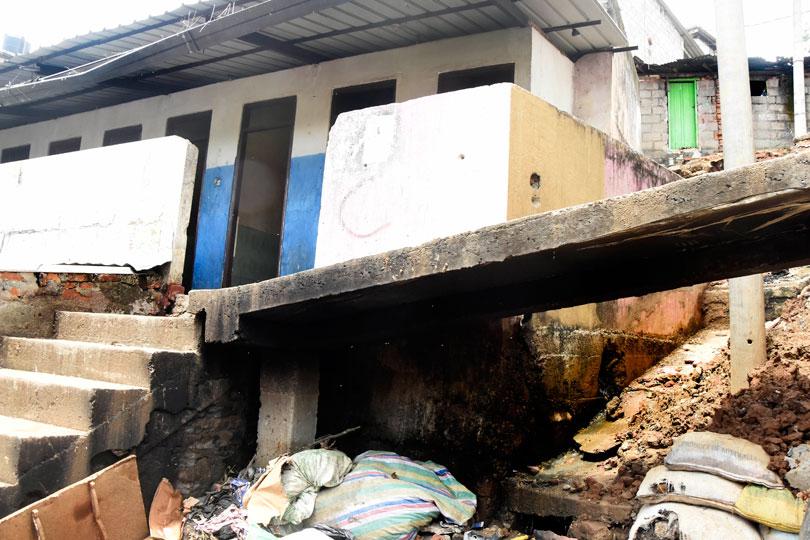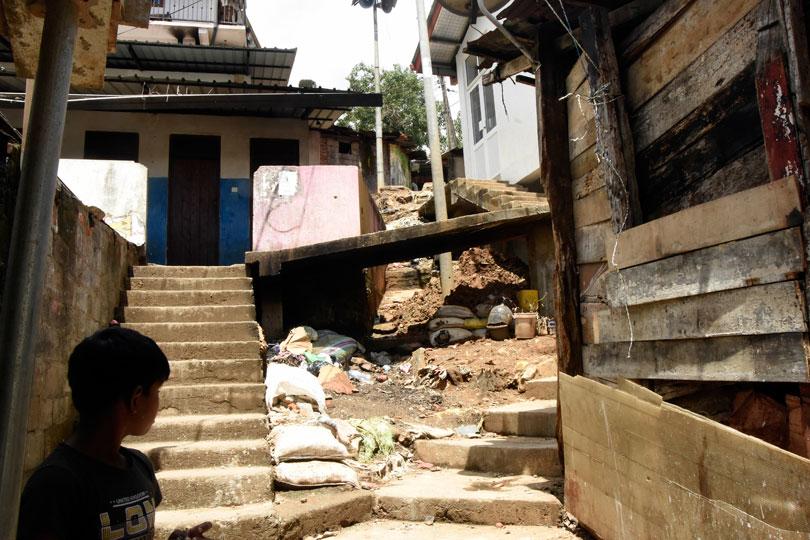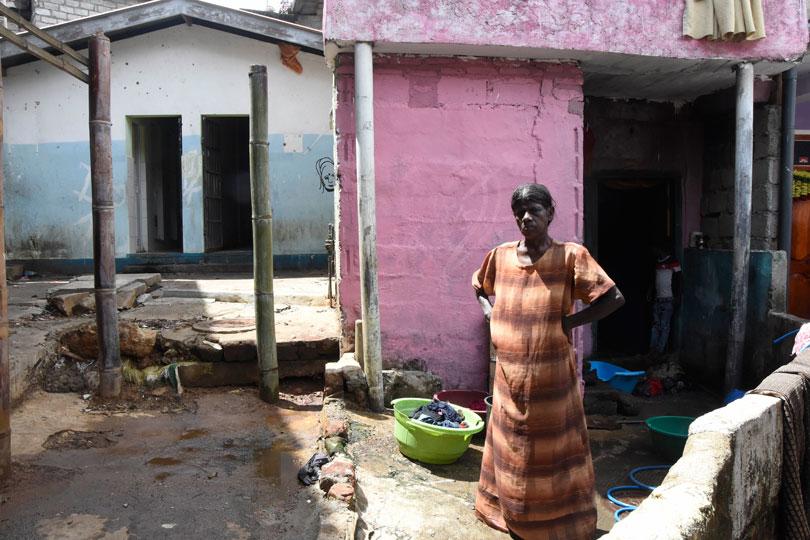Reply To:
Name - Reply Comment
There is an urgent need for the JICA funded project to be maintained with the engagement of the community for sustainable wastewater management
Pics by Nimalsiri Edirisighe
 A.A. Dharmasena Mawatha comes under the Kandy Mahaiyawa JICA project. The project is about managing dirty water in the busy Mahaiyawa area. It’s part of the bigger Kandy City construction of a sewage collection system and manhole pumping stations. Funded by the Japan International Cooperation Agency (JICA), this project works towards building necessities like pipes and treatment plants to collect and clean black water from kitchens, bathrooms and toilets. Before the project came in to being this water was causing big health and environment problems.
A.A. Dharmasena Mawatha comes under the Kandy Mahaiyawa JICA project. The project is about managing dirty water in the busy Mahaiyawa area. It’s part of the bigger Kandy City construction of a sewage collection system and manhole pumping stations. Funded by the Japan International Cooperation Agency (JICA), this project works towards building necessities like pipes and treatment plants to collect and clean black water from kitchens, bathrooms and toilets. Before the project came in to being this water was causing big health and environment problems.
For the record ‘Black water’ is the wastewater from bathrooms and toilets that contains faecal matter and urine. And this article is timely for Daily Mirror readers given that today (June 5) is World Environment Day.
Spanning 733 hectares and connecting 12,200 private residences, state institutions and commercial properties, the project faced challenges due to the area’s complex topography and high population density. Despite these obstacles, the first three stages of the programme were completed. There was a ceremonial opening in 2021 (November) which was attended by the then Prime Minister Mahinda Rajapaksa.
However, during a field visit by the Centre for Environmental Justice (CEJ), the Women’s Development Centre (WDC) and media institutions, ongoing difficulties in maintaining sanitation facilities in low-income housing areas like Mahaiyawa Municipal Council section and Mahaiyawa Model Tenement were observed. Residents expressed concerns regarding the neglected state of common toilets, suffering from vandalism and the disconnection of water supply.
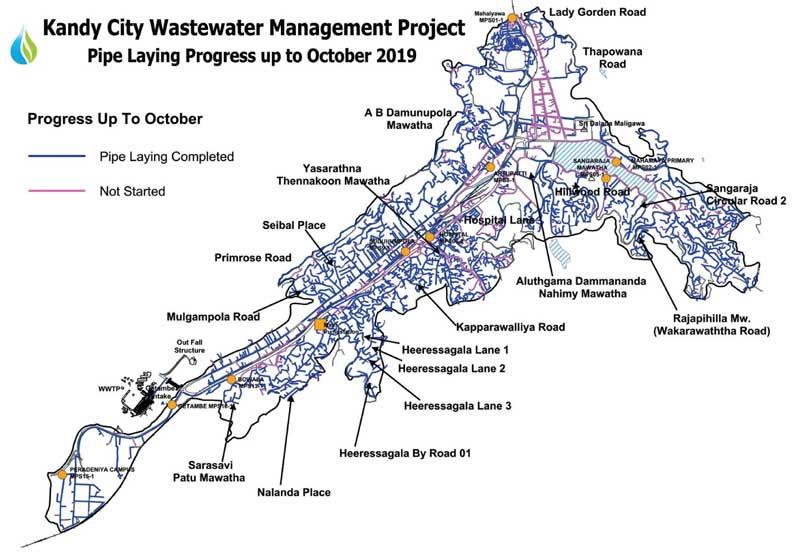
The project underscores the need for continuous maintenance and community engagement for sustainable wastewater management.
Nearly 4,000 people in 2,800 families live in 900 houses in Mahaiyawa and many are employed by the Kandy Municipality. Only six common toilet facilities are available to accommodate the needs of these residents.
Kandy Municipal Council Chief Medical Officer Dr. Pasan Jayasinghe told the media that there is an issue with removing black water from the Mahaiyawa area and channeling it to the wastewater management system. He noted that stakeholder involvement in Mahaiyawa is high.
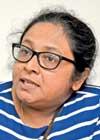
Our organization prioritised the welfare of women and children. The WDC became involved in this situation because women and children were suffering from sanitary issues, which no officials had addressed. It has been five years since JICA abandoned the project”
- Ms. Chandrathileka Liyanaarachchi WDC Project Director
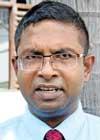
There is an issue with removing black water from the Mahaiyawa area to the wastewater management system. The stakeholder involvement in Mahaiyawa is high. In Mahaiyawa, most houses are informal and do not meet standards. The high population density has caused problems,”
Dr. Pasan Jayasinghe Kandy Municipal Council Chief Medical Officer
In Mahaiyawa, most houses are informal and do not meet standards. The high population density has caused problems. Many residents sleep in shifts due to overcrowding Kandy Municipal Council Chief Medical Officer Dr. Pasan Jayasinghe told the media the following: “There is an issue with removing black water from the Mahaiyawa area to the wastewater management system. The stakeholder involvement in Mahaiyawa is high. In Mahaiyawa, most houses are informal and do not meet standards. The high population density has caused problems”. Many residents sleep taking turns due to overcrowding, according to Dr. Jayasinghe.
Dr. Jayasinghe said that no matter how much sanitation facilities are provided, they are insufficient for the informal population. The project works towards connecting all the black water from these households to the wastewater system, but the contractor withdrew from the ongoing project. As a result, the unconnected houses are now suffering the most. Residents had to pay contractor fees to connect their black water to the main wastewater line.
Residents affirm having to pay fees between Rs. 40,000 and Rs. 60,000. Dr. Jayasinghe shared that he personally paid Rs. 60,000 for the mason and materials to get connected to the system. He clarified that this fee does not go to the Kandy Urban Council, but instead has been utilized to pay the mason and buy raw materials.
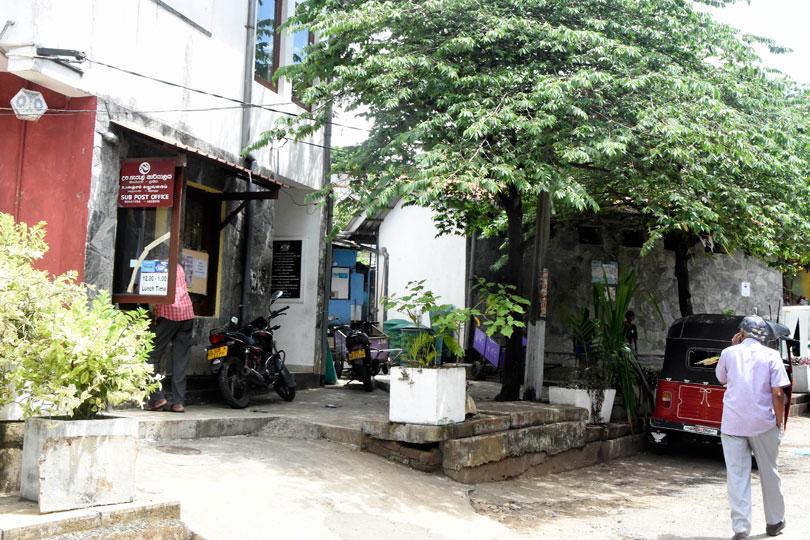
Mahaiyawa Sub-Post Office Sub-Postmaster Ms. K.S. Shyamali Silva said she has concerns regarding the common toilet built when the project office was active. She said, “I work here from 8 a.m. to 4 p.m. and have to deal with the odor. It gets worse during heavy rains when the pits overflow. Over the years, drug addicts have removed the fittings, but people still use the toilet. Recently, the water supply was cut off, but people continue to use it”.
While Ms. Silva deals with this situation during work hours, the residents of the Mahaiyawa Municipal Council section have different issues.
A.A. Dilrukshi, a long-time resident, said that the community didn’t want the facility in the first place. “We were told the toilets were for the Wastewater Management Project officials. But now, other people use them too. We never wanted a shared toilet at the entrance to our lane. We want it removed because it’s bad for the health and also looks bad,” Dilrukshi explained.
She said, “Under the JICA project, every area was dug up to locate the manholes along the sewage line. However, common toilets were not connected to these manholes.
Instead, several people connected their black water lines to gullies by paying Rs. 65,000 to the Municipal Council. Some built sewage tanks inside their houses, spending up to Rs. 70,000 to empty them. Most residents are minor employees of the Kandy Municipal Council who use public toilets. The black water from these toilets flows through drains and even through houses. After JICA stopped the project, our area feels like living in hell,” explained Ms. Dilrukshi.
Before the toilets were built, there had been a grocery store at that place. A resident from the Mahaiyawa Model Tenement said that the shop owner was evicted without being compensated and wasn’t given a new place to operate his business. “The shop owner’s family waited for justice, but eventually moved to Colombo. Our communities endure much. Many residents work for the Kandy Municipal Council as waste collectors, sweepers and parking ticket wardens. Yet our sanitation needs are neglected. We help keep the city clean, but we have to live with overflowing pits and no proper way to dispose of waste and wastewater,” said Ms. Dilrukshi.
Almost three years have passed, but the project is still incomplete because JICA has not released the final Rs. 1 billion needed for its completion.
An official at the project office in Getambe, Kandy, said that he could provide basic information, but couldn’t give detailed explanations or exact dates for when JICA would release the remaining funds.
“JICA has said that Sri Lanka’s debt restructuring is the reason for not releasing the final 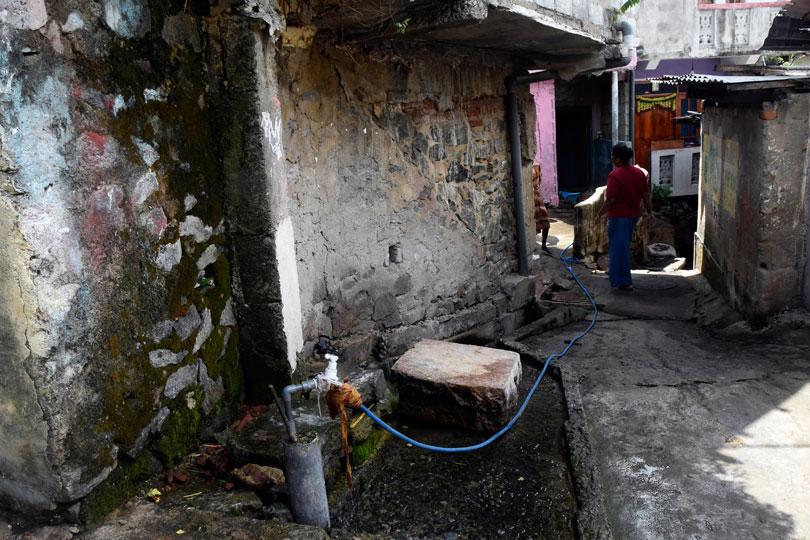
Rs. 1 billion. With the Rs. 21 billion we received in three installments, we completed the stages of surveying, planning, and building infrastructure for the Wastewater Management System. Currently, at least 4,000 households, commercial properties, and institutions are using the facilities. Once we receive the remaining funds, we can connect the last 6,000 wastewater connections,” the official explained.
Attempts made to contact the Kandy Municipal Council Commissioner for comment were unsuccessful. This was because he was attending an official meeting in Colombo and wasn’t available for comments till June 20.
Meanwhile, CEJ Executive Director Dilena Pathragoda said that CEJ and WDC are working together to achieve the Sustainable Development Goal of providing safe water and sanitation.
By collaborating, WDC can carry out community development projects in low-income areas of Kandy that lack proper access to safe water and sanitation.
“We aim to improve these facilities and raise awareness among residents by providing legal support, technical expertise, and informative sessions with the help of experts,” said the CEJ Executive Director.
Former Municipal Councilor Nagaraja Wimalasurendran stated in a meeting that they had previously discussed the issue with public toilet facilities several times. After the JICA project was abandoned, the village had faced several health issues, including problems associated with children, due to the failure of connecting the black water lines to the main line. Despite efforts made during previous governments, no solution was found. “People come and go and no solution was provided, and now we are helpless,” Wimalasurendran said.
Meanwhile, the WDC Project Director, Ms. Chandrathileka Liyanaarachchi, said, “Our organization prioritised the welfare of women and children. The WDC became involved in this situation because women and children were suffering from sanitary issues, which no officials had addressed. It has been five years since JICA abandoned the project”. Ms. Liyanaarachchi emphasised that their intention was to provide some assistance to these innocent people.
Several villagers asserted that their area had been labelled as the main drug dealing point in the country. While rejecting these claims, they explained that drug addicts frequent their toilets often to take drugs and engage in other activities. Many drug addicts used their area as a hiding place from the police. The villagers emphasised that these individuals were not from their community, but despite this, the police and residents from other areas had labelled their neighborhood as a drug dealing hub, unfairly which has stigmatized the locals.
